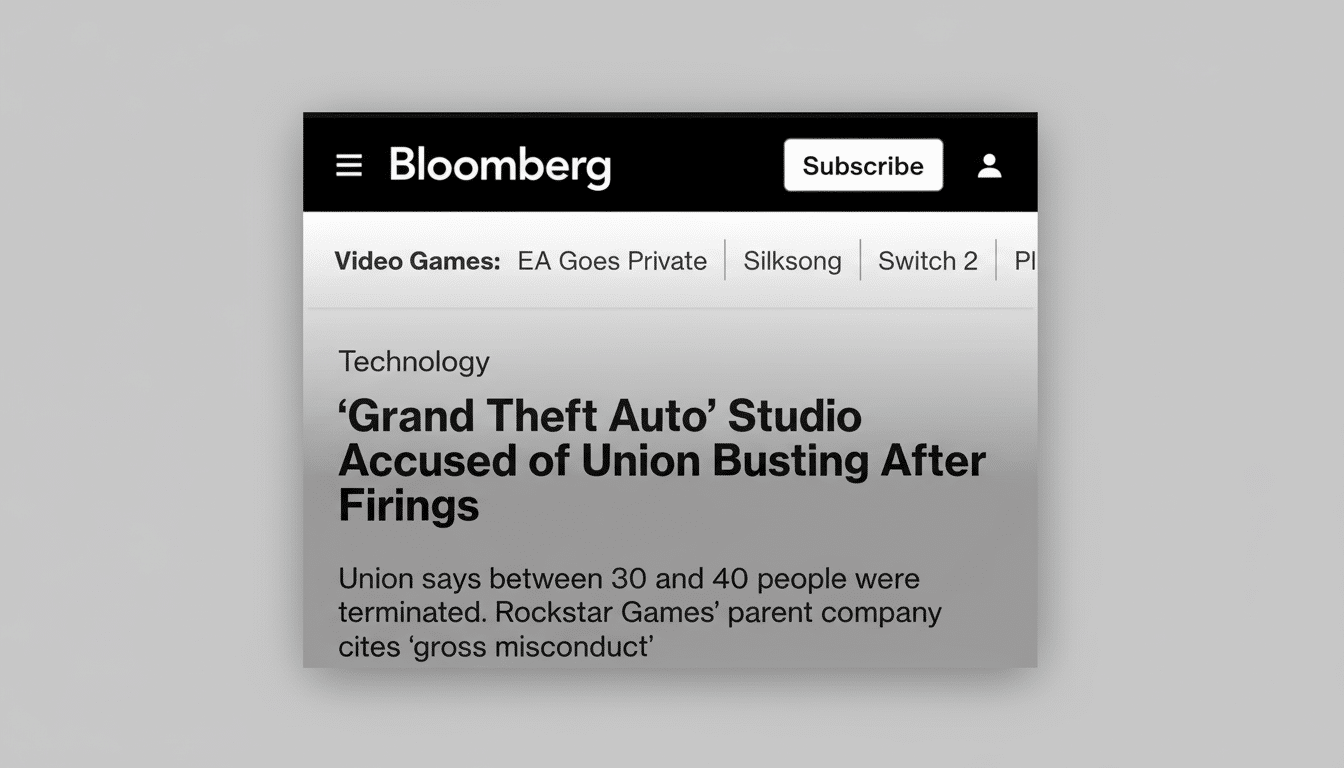The video game company Rockstar Games laid off some 30 employees soon before a fresh delay to its forthcoming Grand Theft Auto VI was announced — in a sequence that has set off accusations of union-busting, rebuttals from the company, and new scrutiny of how the industry handles its secrecy and organizing.
Layoffs And Union-Busting Claims At Rockstar Games
The Independent Workers’ Union of Great Britain says a group of Rockstar workers were fired after discussing the possibility of forming a union. The union told the BBC that the cuts followed internal organizing discussions, painting the move as an intentional one intended to put a damper on collective action at one of the world’s most valuable game studios.

In the U.K., workers have robust legal rights to organize; firing someone for union activities can be considered automatically unfair under trade union law. If the union’s version of events is correct, Rockstar could even be in for legal fights at an employment tribunal. The company runs several studios throughout the U.K., rendering the case a bellwether for how British labor standards dovetail with global AAA game development.
Rockstar Cites Confidentiality Breaches In Firings
Rockstar has denied the accusation that its actions represent union-busting and told Bloomberg that terminations were related to not properly handling private information in public or semi-public settings. The studio has good reason to be sensitive: After early footage of GTA VI leaked in a high-profile way during the game’s development, Rockstar clamped down on information security and added teeth to non-disclosure agreements, according to people familiar with the studio.
NDAs in gaming can get lofty, and internal chat tools such as Slack or Discord might be considered illegal when it comes to project secrets. That is the nature of blockbuster-making, which by its very nature tends toward process and procedure leaks that can buff up or cow production schedules and upset partners or nudge investor expectations. The debate here is over whether the fired workers crossed a confidentiality line — or whether their organizing efforts were the real culprit.
GTA VI Delay Heightens Anticipation And Stakes
Not long after the layoffs, Rockstar told fans on X that GTA VI simply needed more time to shine, while restating its quality standard. And the postponement of it is not a loss that ends with players: parent company Take-Two Interactive has long flirted with the possibility of pulling in overboard at its next bookings report after a major release, and GTA’s place as that centerpiece remains unchallenged.
“GTA V” has sold more than 200 million copies, according to Take-Two financial reports, and GTA Online has brought in recurring revenue for years. A slip in GTA VI’s timeline could have repercussions on marketing windows, platform plans, and resource distribution across Rockstar’s international studios — all of which can exacerbate workplace tension in the final stretch of development.

A Labor Movement In Gaming Finding Its Footing
Organizing within the game industry is still rare, but it has been gaining momentum. Recent union victories include the QA groups at Raven Software and ZeniMax joining the Communications Workers of America, and staff at Sega of America voting to unionize across several departments. The Game Developers Conference’s yearly survey has consistently discovered that over half of professional game developers support unionization in theory, but the rate of union density remains low compared to more traditional industries.
In the U.K., government statistics suggest that around a quarter of British workers are union members overall, but tech and creative work under-index. That gap is causing some significant friction in contexts where crunch and NDAs and return-to-office mandates intersect with a workforce that is, gradually for sure but not quite glacially, organizing-curious by the minute.
What To Watch Next For Rockstar, Unions, And GTA VI
If IWGB takes the dispute all the way through formal proceedings, it could serve as a test of how much confidentiality policies may restrict protected organizing.
It may also encourage closer inspection of the way studios delineate “public” discourse in modern hybrid workplaces, and whether internal channels are fair game for discussing work conditions.
The near-term challenge for Rockstar is dual: focusing on steady development for GTA VI and a need to rebuild trust moving forward among teams, particularly amid headlines of layoffs and labor disputes. For the rest of the industry, the episode highlights a balance between secrecy that is necessary for billion-dollar franchises and workers’ right to organize that continues to be navigated by force, it seems — tensions which are only set to increase as release windows stretch and expectations rise.

